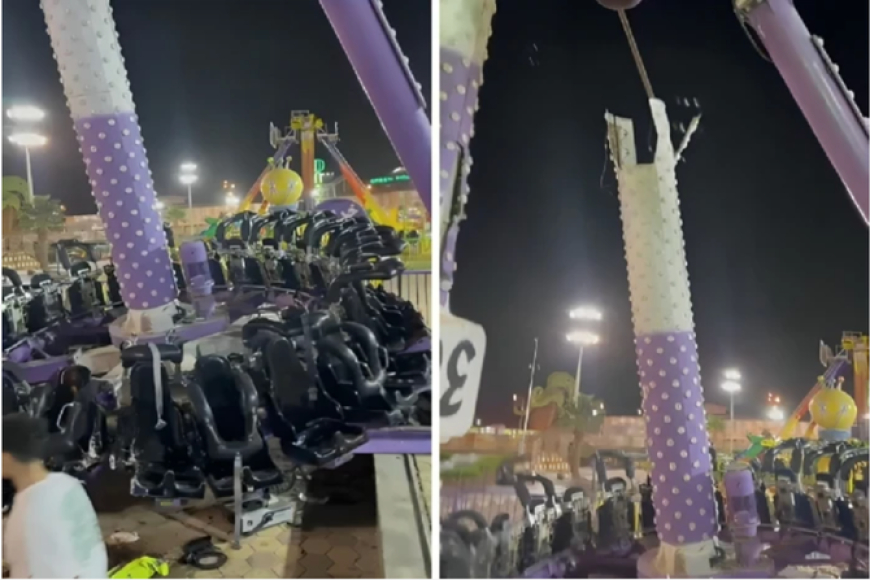Pendulum Ride Collapse in Taif: Over 20 Injured as Green Mountain Park Shut Down Amid Probe
A swing ride at Green Mountain Park in Taif, Saudi Arabia snapped in half mid‑air, injuring 23 people. Authorities have shut the park and launched a technical investigation into safety practices.

On July 31, 2025, Green Mountain Park—one of Taif, Saudi Arabia’s popular mountain resort attractions—was the scene of a terrifying accident. During normal evening operations, the “360 Big Pendulum” ride snapped in half mid‑air, sending the passenger platform crashing violently to the ground. The collapse resulted in 23 people being injured, with at least three in critical condition. Government authorities have since closed the ride and launched a full safety investigation.YouTube+10AP News+10The Times of India+10
The Incident: What Happened
Witnesses reported the ride was swinging passengers in a broad arc when a loud cracking noise was heard. The central support arm fractured, causing the entire gondola to detach and plummet. Some debris struck individuals nearby. Although riders were securely strapped in, the shock and recoil caused severe impact injuries.AP News+1ABC News+1
Emergency Response and Medical Care
Medical teams at the park provided immediate first aid, while several victims were transferred to local hospitals. Taif authorities declared a code yellow emergency, mobilizing additional ambulance support.People.com
Follow-Up Action: Park Closure and Probe Ordered
Following the accident, Prince Saud bin Nahar bin Saud bin Abdulaziz, Governor of Taif, ordered the park’s temporary closure pending investigation. The collapse spot and surrounding rides have been cordoned off, and all mechanical systems placed under scrutiny. A technical panel has been dispatched to examine ride records and structural integrity.YouTube+10AP News+10ABC News+10
Deeper Context: Safety Standards Under the Spotlight
The ride—a central attraction for thrill-seeking visitors—has been linked to ongoing safety concerns over ride maintenance, operator training, and regulatory oversight. In a broader context, a separate review of global ride accidents (e.g. Europe’s Ali Baba riding collapse) shows recurrent themes of poor maintenance, inadequate inspections, and human error.en.wikipedia.orgen.wikipedia.org
Analysts say the speed and severity of this accident underscore systemic risks in some amusement facilities across the Middle East and beyond.
Why This Matters
-
Public Safety Concerns Escalate
Ride failures—especially involving mechanical collapse—force us to question whether safety checks and certification regimes are strictly followed. -
Regulatory Accountability
Governments in the region may now face urgent pressure to strengthen amusement park governance, including routine auditing and third-party inspections. -
Tourism & Local Impact
Taif is a major leisure destination attracting regional tourists; the fallout may dent public confidence, affecting visitor numbers and local revenue. -
Manufacturing & Engineering Scrutiny
If structural defects or mechanical failure are identified, manufacturers and fabrication origin become central to legal liability and industry reform.
Voices from the Ground and Authorities
Eyewitnesses described “terror and chaos” as guests screamed, dropped belongings, and fled. One observer said the support structure appeared damaged years ago, as minor cracks were visible beneath peeling paint—raising questions about preventive maintenance.
In contrast, park management has yet to issue a formal statement, claiming only that safety "measures were routine and up to standard" until the incident.
What’s Next: Investigation and Accountability
Sources indicate the probe will involve:
-
Structural engineers reviewing ride design and maintenance logs
-
Forensic inspectors examining the fractured arm at failure points
-
Interviews with ride operators and maintenance personnel
-
Assessments of ride load capacity, emergency shutdown systems, and inspection timelines
Should negligence be confirmed, park operators could face fines or license suspensions mandated under Saudi safety law.
Broader Patterns: Increasing Ride Accidents Globally
This is not an isolated incident. Similar ride collapses have occurred elsewhere:
-
England’s Surf Rider collapsed in 2011 due to gearbox failure, injuring passengers up to 90° lodged sideways.The Times of Indiaen.wikipedia.orgFox News
-
In India, within the past year, theme park accidents have resulted in fatalities and multiple injuries, prompting stricter municipal safety audits.People.com
These incidents all point to a global urgency to modernize maintenance standards and enforce third-party certification.
Preventive Recommendations
-
Mandatory Safety Certification: Operators should be licensed and revalidated annually.
-
Independent Third-Party Audits of rides, to reduce conflict-of-interest risk.
-
Transparency on Inspection Logs: These should be available for public scrutiny, especially for high-thrill rides.
-
Operator and Staff Training, including emergency response protocols.
Authorities globally are now moving toward creating regulatory frameworks that reflect such standards—and Saudi Arabia may soon follow suit.
Final Thoughts
The collapsed “360 Big Pendulum” ride at Taif is not only an accident—it’s a warning. As amusement parks expand across the Gulf region, and leisure tourism grows, so too must the rigour of safety practices and oversight. While no lives were lost this time, the long-term impact on policy, public trust, and industry standards will be the story that follows.









